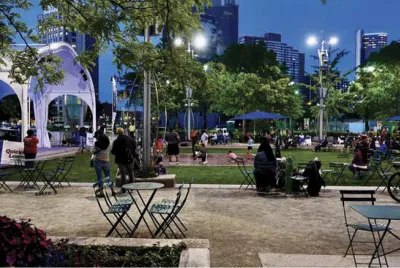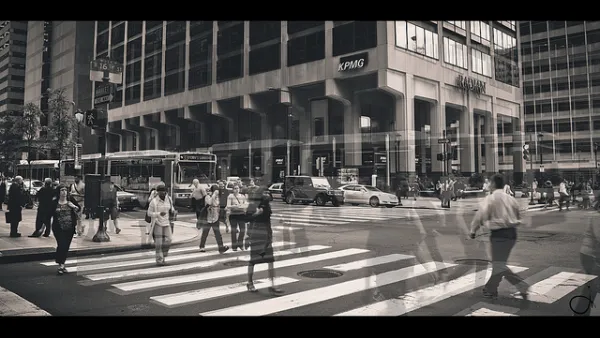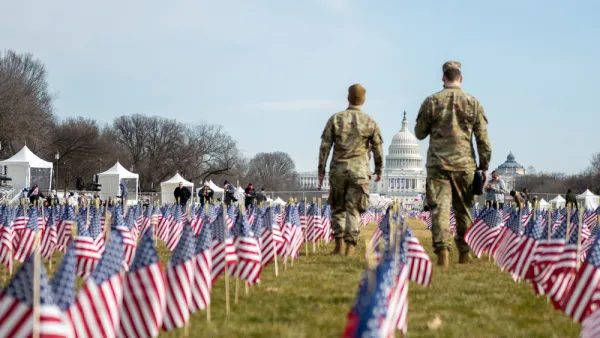Cities have more experience, and examples, than they might realize when it comes to reinventing systems of investment and governance to recover from the economic ravages of the COVID-19 pandemic.

Rip Rapson, president and CEO of the Kresge Foundation, writes for Bloomberg CityLab on how Detroit's recent experience with municipal bankruptcy provides lessons that can inform a radical new model of economic recovery—a mode necessitated by the scale of the pandemic crisis and the economic stagnation and racial injustice that existed before the novel coronavirus.
Rapson recalls the "Build Back better" mantra of the economic recovery plan proposed by the Biden administration during the presidential campaign and embodied in the American Rescue Plan, approved earlier this year, and the American Jobs Plan, proposed more recently but still a long way away from approval.
The more expansive view of infrastructure proposed by the American Jobs Plan is central to Rapson's argument about the examples available from Detroit's experience in recovering from municipal bankruptcy.
As my work at the Detroit-based Kresge Foundation has shown me, human services, rather than being viewed simply as platforms for crisis management, must be understood as an integrated suite of supports capable of breaking down barriers that inhibit family economic productivity in favor of creating pathways to economic mobility.
The federal government cannot masterplan this infrastructure of economic mobility, nor should cities be expected to absorb massive volumes of funding in heavily prescribed ways. Cities must have creative latitude to customize strategies to residents’ needs and build partnerships across the public, private, nonprofit and philanthropic sectors. Those relationships can multiply federal resources, unlock new forms of innovation, and engage community residents in the complexities of local problem-solving.
Cities are already well underway with that kind of reinvention, according to Rapson—as exemplified by the systems established in cities to set up testing and vaccination capacity during the pandemic. Moreover, cities can look to Detroit's example from before the pandemic. According to Rapson, "rather than ushering in doom, Detroit’s bankruptcy catapulted the city into reimagination, recalibration and renewal." Numerous Detroit-specific examples of what it means to Build Back Better, and how cities are positioned to start doing just that, can be found in the source article at the link below.
FULL STORY: Detroit Showed What ‘Build Back Better’ Can Look Like

National Parks Layoffs Will Cause Communities to Lose Billions
Thousands of essential park workers were laid off this week, just before the busy spring break season.

Retro-silient?: America’s First “Eco-burb,” The Woodlands Turns 50
A master-planned community north of Houston offers lessons on green infrastructure and resilient design, but falls short of its founder’s lofty affordability and walkability goals.

Delivering for America Plan Will Downgrade Mail Service in at Least 49.5 Percent of Zip Codes
Republican and Democrat lawmakers criticize the plan for its disproportionate negative impact on rural communities.

Test News Post 1
This is a summary

Test News Headline 46
Test for the image on the front page.

Balancing Bombs and Butterflies: How the National Guard Protects a Rare Species
The National Guard at Fort Indiantown Gap uses GIS technology and land management strategies to balance military training with conservation efforts, ensuring the survival of the rare eastern regal fritillary butterfly.
Urban Design for Planners 1: Software Tools
This six-course series explores essential urban design concepts using open source software and equips planners with the tools they need to participate fully in the urban design process.
Planning for Universal Design
Learn the tools for implementing Universal Design in planning regulations.
EMC Planning Group, Inc.
Planetizen
Planetizen
Mpact (formerly Rail~Volution)
Great Falls Development Authority, Inc.
HUDs Office of Policy Development and Research
NYU Wagner Graduate School of Public Service





























